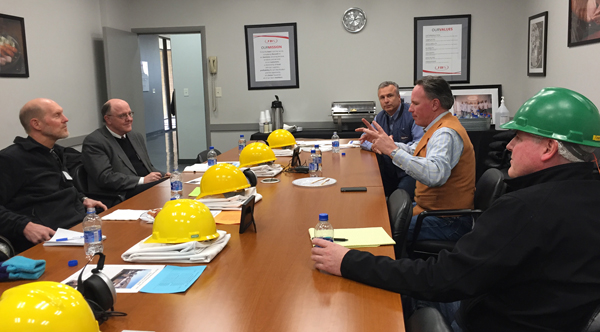By Barb Arland-Fye
The Catholic Messenger
OTTUMWA — Everyone gathered at the conference table inside the JBS meat-packing plant last month came from a different perspective but a shared commitment: opening the doors for refugees and immigrants seeking new lives and decent jobs.
Bishop Thomas Zinkula of the Diocese of Davenport viewed the gathering he attended as an opportunity to support Pope Francis’ Share the Journey campaign. The two-year initiative aims to inspire communities to build relationships with refugees and immigrants, and to love their neighbors in the U.S. and around the world.

Bishop Thomas Zinkula (front, left) listens to Chandler Keys, a lobbyist based in Washington, D.C., during a gathering of religious and secular leaders at JBS meat-packing plant in Ottumwa on Feb. 16. The leaders share a commitment to opening the doors for refugees and immigrants seeking new lives and decent jobs.
Others at the conference table Feb. 16 included JBS General Manager Troy Mulgrew; HR Manager Javier Alvarez; Washington, D.C., lobbyist Chandler Keys; and Matt Wilch, Refugee Policy Advisor for the U.S. Conference of Catholic Bishops’ Migration and Refugee Services. They were joined later by Ottumwa Mayor Tom Lazio and then by Iowa Gov. Kim Reynolds and Lt. Gov. Adam Gregg.
“Refugees and immigrants are among the new Iowans, like my great-great-grandparents were a couple of generations ago,” the bishop said. “It is a deeply rooted Catholic, Christian value to welcome refugees. Jesus and his family were refugees, fleeing for their lives.”
JBS employees 2,400 people; 6 percent of them are refugees. The plant experiences a turnover rate of about 53 percent annually, resulting in a transient workforce that impacts production. The plant processes 21,000 hogs daily, spread over two shifts. “Staffing this plant is a full-time job,” Mulgrew said. The work is “tough,” but the pay is good — as much as $60,000 under the new contract wage rate if someone works their way up and becomes a supervisor, he added.
The goal is to hire an additional 200 workers, but JBS isn’t getting enough interest from local applicants. Refugees and immigrants eager to work hard and begin a new life in Ottumwa have proven to be part of the solution. Some 225 new refugees are working at the plant; more are needed, Mulgrew said. “Refugees are very motivated people; they want to work.” Some cultural clashes have occurred, but JBS is striving to improve relations by providing outreach to refugees, immigrants, Hispanics and to the local community.
Lazio, Ottumwa’s mayor, said JBS has worked well with refugees arriving in Iowa, which has resulted in more refugees moving to Ottumwa in the last year and the need for additional housing. JBS is looking at an initiative to address the city’s housing shortage and to accommodate the needs of new residents who come to work for the plant.
“This past fall, the management at JBS approached the city and shared that they want to do some housing program for their employees. Apparently a sister plant had done this and was very successful,” Lazio said. “Since JBS was willing to fund the project, we were happy to listen and offered to work with their staff to put together a plan that could be shared with the JBS corporate leadership.”
JBS was to meet with its corporate leadership to see “what they might be willing to support in terms of dollars and timeline,” Lazio said, and then meet again with the city to see what the next steps might be.
The connection with the U.S. Conference of Catholic Bishops (USCCB) developed when Keys, the Washington, D.C., lobbyist, reached out to the refugee committee. Keys and Wilch have been working together to educate Congress about the crucial need for refugees to help address the worker shortage in the meat-packing industry.
“Oftentimes meat packing has been a sector in which refugees, immigrants and first-generation Americans can get a good start in life,” Keys said. “We find them to be reliable, hard-working employees. Refugees, for example, also are “check the box” kind of people. They had to go through very rigorous, step by step processes to get here from refugee situations, like these large camps run by the U.N. They would not have made it here unless they had the discipline to persevere and go through those processes. ”
The USCCB’s Migration and Refugee Services coordinates the Catholic resettlement network, which is made up of Catholic Charities’ agencies that participate in the refugee admissions program, Wilch said. “Right now, USCCB/MRS works with Catholic Charities’ partners in more than 40 states, including Iowa, to welcome refugees.
Catholic Charities of Des Moines resettles refugees in Iowa, as does the U.S. Committee for Refugees and Immigrants. These groups, in turn, partner with federal and state governments, the local community and thousands of local volunteers. “A cornerstone of the program is to help refugees and their families building resiliency and self-sufficiency, with an important ingredient of that being early employment,” Wilch said. “Consequently, local Catholic Charities are in contact with local employers to help refugees find decent jobs so they can support their families and build their new lives in the United States. One of those local employers has been JBS and the many other packing plants in Iowa and across the country that hire refugees.” Many other employers across the country do so, as well, he said.
At the diocesan level, “We appreciate the chance to welcome newcomers in collaboration with Des Moines Catholic Charities. We have a staff working on immigration issues and other related issues,” Bishop Zinkula said. “Pope Francis talks about going to the peripheries, going to the margins so that immigrants and refugees can be welcomed and accompanied as they rebuild their lives.” The bishop added, “Some of the newcomers are Catholic and some are not, but as Matt said, we don’t help them because they’re Catholic. We help them because we’re Catholic.”
Parish and JBS differ in their views of management-labor relations
By Barb Arland-Fye
The Catholic Messenger
OTTUMWA — The pastor of St. Mary of the Visitation Parish in Ottumwa and the multicultural minster for the Ottumwa area were surprised to be invited to meet with JBS management last month.
During the meeting, Father James Betzen, C.PP.S., and Sister Irene Munoz, CHM, were encouraged to help find workers for JBS, which already employs numerous members of St. Mary Parish.
Ottumwa JBS General Manager Troy Mulgrew talked about the good wages the plant pays and the need to hire additional workers to meet the demands of JBS’ customers, which includes Costco, among others. The plant, which operates two shifts, processes 21,000 hogs a day. Fr. Betzen and Sr. Munoz received a stack of colored sheets of paper printed with the plant’s new contract wage rate and maintenance rate to distribute at the parish. Contact information for the plant’s employment center appeared on the back side.
That meeting took place the day before JBS management met with a group of dignitaries, including Bishop Thomas Zinkula, to discuss collaborative efforts to welcome refugees to the workforce and the community.
Sr. Munoz pointed out to management that some of St. Mary’s parishioners employed at the plant are unhappy. Their main complaints are long work hours and concerns for safety, she said. They were told that efforts to improve relations between employees and supervisors are ongoing, and include the rating of supervisors by employees. The management team acknowledged that the work is hard, but that workers are well paid because of it.
In a later interview, a parishioner who works on the line at JBS told The Catholic Messenger, “It is good to have a job” but “they don’t care about us. They care about the job.”
A second parishioner/ line worker said, “They see only the final dollar … they think that we are like machines … like robots or something like that.”
The management team has a different view. Mulgrew has made a concerted effort to improve labor-management relations, Chandler Keys, a Washington, D.C.-based lobbyist who represents JBS among other clients, told The Catholic Messenger.
During the meeting with dignitaries Feb. 16, Mulgrew pointed to a whiteboard in the plant’s conference room with numbers representing the rating for unnamed supervisors. Many 10s and 9s appeared on the board, a considerable boost from the 2s, 3s and 4s supervisors received last year, he noted.
“Twenty people off the floor, once a week, go through the pluses and minuses of their supervisors,” Keys said. This system is becoming “a template” for other JBS plants to assess management and labor relations, he added.











